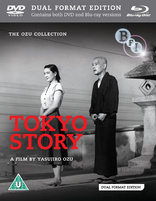Tokyo Story Blu-ray Movie
HomeTokyo Story Blu-ray Movie 
東京物語 / Tôkyô monogatari / The Ozu Collection / Blu-ray + DVDBFI Video | 1953 | 136 min | Rated BBFC: U | Jul 19, 2010
Movie rating
8.5 | / 10 |
Blu-ray rating
| Users | 3.8 | |
| Reviewer | 4.5 | |
| Overall | 3.8 |
Overview
Tokyo Story (1953)
An aging couple journey to visit their grown children in bustling postwar Tokyo.
Starring: Chishû Ryû, Chieko Higashiyama, Setsuko Hara, Haruko Sugimura, Sô YamamuraDirector: Yasujirô Ozu
| Foreign | Uncertain |
| Drama | Uncertain |
| Melodrama | Uncertain |
Specifications
Video
Video codec: MPEG-4 AVC
Video resolution: 1080p
Aspect ratio: 1.33:1
Original aspect ratio: 1.37:1
Audio
Japanese: LPCM 2.0
Subtitles
English
Discs
50GB Blu-ray Disc
Two-disc set (1 BD, 1 DVD)
DVD copy
Playback
Region B (locked)
Review
Rating summary
| Movie | 5.0 | |
| Video | 3.5 | |
| Audio | 3.5 | |
| Extras | 0.0 | |
| Overall | 4.5 |
Tokyo Story Blu-ray Movie Review
Reviewed by Dr. Svet Atanasov August 18, 2010Japanese director Yasujiro Ozu's "Tokyo Story" (1953) arrives on Blu-ray courtesy of the British Film Institute. The only supplemental feature included with this release is Yasujiro Ozu's "Brothers and Sisters of the Toda Family" (1941), which is placed on a separate SDVD. A 22-page illustrated booklet is also included. In Japanese, with optional English subtitles for the main feature. Region-B "locked".
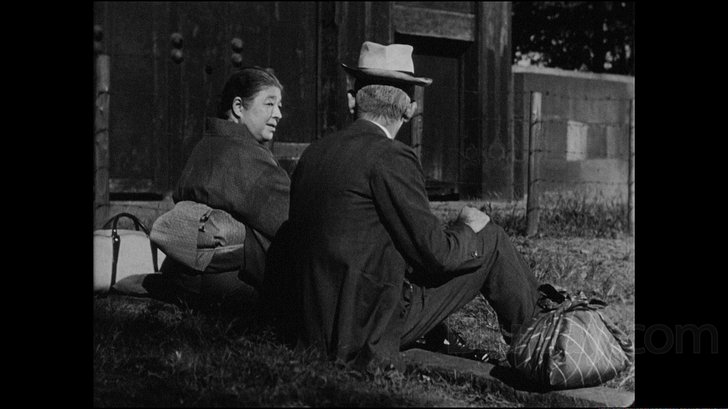
Shukishi and Tomi
In Japanese director Yasujiro Ozu’s Tokyo Story an elderly couple, Shukishi (Chishu Ryu, Akira Kurosawa’s Red Beard) and Tomi (Chieko Higashiyama, Magokoro), from the provincial town of Onomichi travels to Tokyo to visit their grown-up children who have not visited them in years. They know the type of careers their children have but are curious to see the families they have created.
Once Shukishi and Tomi arrive in Tokyo they quickly realize that their children have changed - Koichi has become a respected pediatrician but lost his sense of humor; Shige has become a successful beautician but is now obsessed with money. Shukishi and Tomi are also surprised to see how different life in Tokyo is compared to Onomichi.
The children send their parents to Atami Hot Springs – it costs less to have them there than at their homes. A few days later, Shukishi and Tomi decide that it is time to head back to Onomichi. Their widowed daughter-in-law, Noriko (Setsuko Hara, Akira Kurosawa’s The Idiot), is the only person who is genuinely saddened to hear that they are leaving.
On the way back, Tomi becomes seriously sick. Shukishi immediately informs the family and they all gather in Onomichi. Shortly after, Tomi passes away. No one is as concerned about Shukishi’s future as Noriko. Shige even mentions that she would have preferred to see her father pass away first. Eventually, everyone leaves.
Widely regarded as one of the greatest films ever made, Ozu’s Tokyo Story has not always been easy to see in the United States. Prior to Criterion’s SDVD release, the only way to see Tokyo Story was via second-hand VHS copies. Nowadays, with a few exceptions, most of Ozu’s films are relatively easy to locate and purchase.
Tokyo Story is comprised of short episodes chronicling life in post-war Japan, and specifically the generational conflict between children and parents exacerbated by the country’s rapid industrialization. The key themes in Tokyo Story, however, are universal in nature.
There are hardly any traces of melodramatic cliches. Powerful climaxes are also missing. Throughout the film there are no attempts by Ozu to side with or blame any of the main protagonists either - the viewer is simply left to contemplate the motives behind their decisions.
The overwhelming majority of the time Ozu’s camera remains static, primarily at floor level, observing the main protagonists from afar. The occasional panoramic vistas from Tokyo are also notably serene. The dialog is fairly basic. Like most of Ozu’s films, Tokyo Story also has a consistent, slow pacing.
The cast is very good. Legendary Japanese actor Chishu Ryu, for instance, is outstanding as the wise Shukishi. There is something quite remarkable about the quiet and surprisingly relaxed manner in which he handles disappointment and pain. Setsuko Hara is also impressive as the young and disillusioned but respectful widow Noriko.
Note: In 1958, Tokyo Story was recognized with the Sutherland Trophy at the British Film Institute Awards.
Tokyo Story Blu-ray Movie, Video Quality 
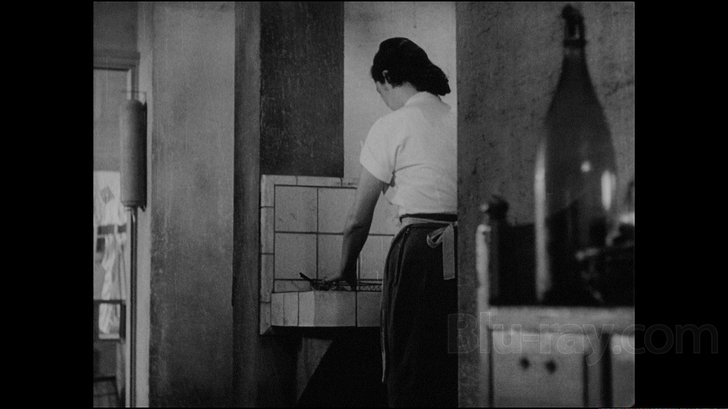
Presented in an aspect ratio of 1.33:1, encoded with MPEG-4 AVC and granted a 1080p transfer, Yasujiro Ozu's Tokyo Story arrives on Blu-ray courtesy of the BFI.
Sourced from elements provided by Criterion, the high-definition transfer conveys pleasing detail and relatively stable contrast levels. Clarity, however, varies quite a bit; there is some inherited softness during selected scenes as well. There are no serious stability issues, but some frame transitions are problematic. I assume that they are also inherited. Edge-enhancement and macroblocking are not a serious issue of concern. There are no traces of heavy noise reduction either. Finally, I must note that there are numerous flecks and small scratches that pop up here and there. To sum it all up, if one takes into account the troubled history of Tokyo Story (the original negative has been long lost), this Blu-ray release probably offers the best possible presentation of this important film that can be had at the moment. (Note: This is a Region-B "locked" Blu-ray disc. Therefore, you must have a native Region-B or Region-Free PS3 or SA in order to access its content).
Tokyo Story Blu-ray Movie, Audio Quality 
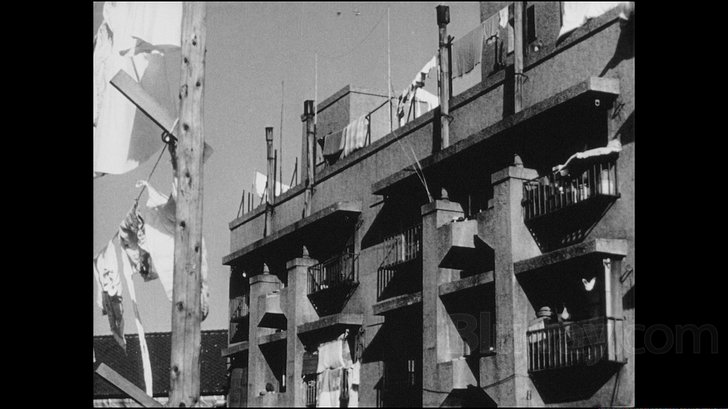
There is only one audio track on this Blu-ray disc: Japanese LPCM 2.0. For the record, the BFI have provided optional English subtitles for the main feature.
The Japanese LPCM 2.0 track is pleasing - slightly crisper and better balanced than the Japanese audio track found on the Criterion SDVD release of Tokyo Story - but has a fair share of limitations. For example, occasionally the high-frequencies fluctuate, and mild background hiss is often easy to hear. Once again, however, I must speculate that these limitations are indeed inherited and likely next to impossible to address. For the record, the optional English subtitles are very well done.
Tokyo Story Blu-ray Movie, Special Features and Extras 
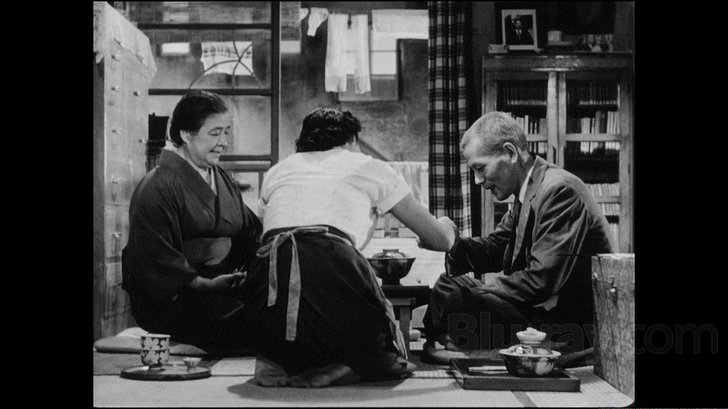
Note: This release of Yasujiro Ozu's Tokyo Story also contains the director's early film Sisters of the Toda Family (1941), which is placed on a separate SDVD. Unfortunately, I did not get a copy of it to review and therefore cannot comment on the quality of the presentation. The actual Blu-ray disc does not contain any supplemental features.
Booklet - 22-page illustrated booklet containing Joan Mellen's essay "A family in crisis" (Mrs. Mellen is a professor of English and creative writing at Temple University in Philadelphia, Pennsylvania); Yasujiro Ozu biography by Tony Rayns; and John Gillett's essay "The Tokyo Story" (Mr. Gillett was a long standing Research Officer with the BFI and a National Film Theatre programmer).
Tokyo Story Blu-ray Movie, Overall Score and Recommendation 

I am incredibly pleased to see Yasujiro Ozu's Tokyo Story, as well as the rest of the Japanese director's films which the BFI have just released, on Blu-ray. If you could play Region-B releases, I strongly encourage you to consider adding every single one of these discs to your libraries. This is Essential Cinema, folks. VERY HIGHLY RECOMMENDED.
Similar titles
Similar titles you might also like

The Only Son
一人息子 / Hitori musuko
1936

Early Summer / What Did the Lady Forget
麦秋 / Bakushū / The Ozu Collection
1951

Late Spring
晩春 / Banshun
1949

An Autumn Afternoon
秋刀魚の味 / Sanma no aji | The Ozu Collection
1962

Equinox Flower
彼岸花 / Higanbana / The Ozu Collection
1958

Late Autumn / A Mother Should Be Loved
秋日和 / Akibiyori | The Ozu Collection
1960

Good Morning
お早よう / Ohayō / The Ozu Collection
1959

Yi Yi
一一 / A One and a Two
2000

Ikiru
生きる
1952

Still Walking
歩いても 歩いても / Aruitemo aruitemo
2008

Sansho the Bailiff
山椒大夫 / Sanshô dayû
1954

Floating Weeds
浮草 / Ukigusa / Masters of Cinema
1959

Harakiri
切腹 / Seppuku / Masters of Cinema
1962

Persona
1966

Record of a Tenement Gentleman
長屋紳士録 / Nagaya shinshiroku
1947

Profound Desires of the Gods
神々の深き欲望 / Kamigami no Fukaki Yokubo / Masters of Cinema
1968

Bicycle Thieves
Ladri di biciclette / Arrow Academy
1948

Wild Strawberries
Smultronstället
1957

There Was a Father
1942

La Règle du Jeu
The Rules of the Game
1939
